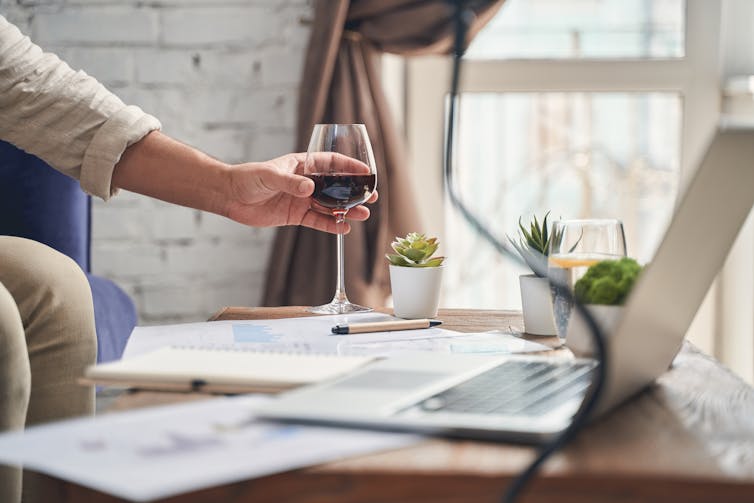If you're drinking or betting more in lockdown, you're not alone. But watch for these signs of addiction
- Written by Anastasia Hronis, Clinical Psychologist, University of Technology Sydney
For the millions of Australians currently living under lockdowns — many without clarity on when things might return to “normal” — there’s no doubt the restrictions on our day-to-day lives present a variety of challenges and hardships.
But for people who have addictions, or who are at risk of developing an addiction, lockdowns can pose a unique set of difficulties.
Some worrying trends
Lockdowns have changed the way Australians drink alcohol, use drugs, smoke and gamble.
For a portion of people, these behaviours have actually decreased during lockdowns[1], largely as a result of less face-to-face socialising, and the closure of pubs, clubs and gaming venues.
But other Australians have been more likely to reach for a drink during lockdown, or place a bet.
During the nationwide COVID lockdown in 2020, researchers found one in five Australians[2] increased their alcohol consumption. This is broadly consistent with reports from overseas[3].
The increase in drinking was particularly significant for women[4], especially those caring for children. For men, job loss (or having fewer hours in work) was associated with an increase in alcohol intake. Respondents reported that higher stress levels, spending more time at home, and boredom led them to drink more than usual.
We know stressful circumstances, increases in psychological distress and pre-existing mental health conditions make people more vulnerable to developing addictions[5].
In a survey[6] on the impact of last year’s lockdown on gambling in Australia, researchers actually found most people either gambled less or about the same as before.
But of those who reported gambling more during lockdown (11%), more than half were at risk of developing a gambling problem (as assessed by a questionnaire), or already had a gambling problem.
Alcohol, drugs, cigarettes, gambling and other behaviours can quickly become unhealthy ways of coping with the mental distress associated with the pandemic.
Read more: Worried about your drinking during lockdown? These 8 signs might indicate a problem[7]
Disruptions to treatment
Lockdowns have also changed the way people access alcohol, gambling or engage in other potentially addictive behaviours. For example, some people may have started buying alcohol online. And those who had previously visited the pokies may have turned to online gambling.
These people will likely continue to see targeted advertisements for similar online services. For people with an addiction or who are struggling with their consumption, ads like these can be especially triggering.
 Some people have reported gambling less during lockdowns, while others are doing more of it.
Shutterstock[8]
Some people have reported gambling less during lockdowns, while others are doing more of it.
Shutterstock[8]
Compounding these challenges, many people who had actively been seeking treatment for an addiction have faced disruptions to their care[9] during the pandemic. Social distancing requirements have necessitated reductions in the capacity of rehabilitation centres and drug and alcohol services.
With many of these services already having long waiting lists, this has served as an additional barrier to treatment. Without adequate support through inpatient or outpatient services, people in recovery are at greater risk of relapse[10].
Read more: We're told to 'gamble responsibly'. But what does that actually mean?[11]
Prevention is key
While having a mental health condition can increase the risk of developing an addiction, the reverse is also true[12]. Addiction issues can worsen existing mental health concerns, or result in the development of mental health problems a person didn’t have before.
And addiction issues don’t only affect the individual; their families and loved ones suffer too. For example, we know for every problem gambler, six people close to them are affected[13]. This can be because of resulting financial hardships or strain on relationships[14], among other things.
It’s important people access professional support if they’re feeling vulnerable or are noticing any changes[15] within themselves.
 Addiction affects the individual, but also people around them.
Shutterstock[16]
Addiction affects the individual, but also people around them.
Shutterstock[16]
Signs to look out for in yourself (and those close to you)
There’s nothing wrong with having a glass of wine with dinner every so often, or betting on a sports match here or there. What we want to try to avoid is doing these things as a means of relieving stress, rather than for enjoyment and pleasure.
Look out for signs of increasing particular behaviours, or even thinking about something like drinking alcohol, smoking or gambling more than you usually would.
Be aware if these things start to have a negative impact on other areas of your life. For example, needing to borrow money as a result of too much gambling, not spending time with the family because of drinking, or frequent thoughts about the next time you’ll have a drink, place a bet or smoke a cigarette disrupting your work.
Also be aware of building up a tolerance, and needing more of the substance to get the same effect.
Read more: A mental disorder, not a personal failure: why now is the time for Australia to rethink addiction[17]
If you notice any of these signs in yourself or others, help is available.
During lockdowns, many health-care services are able to provide telehealth phone and video support, where face-to-face care is not available. Your GP will be able to provide you with referrals to relevant services.
Some helpful resources can be found at the Alcohol and Drug Foundation[18], Gambling Help Online[19], SMART Recovery[20] and Family Drug Support[21].
References
- ^ decreased during lockdowns (www.elsevier.com)
- ^ one in five Australians (csrm.cass.anu.edu.au)
- ^ from overseas (link.springer.com)
- ^ for women (csrm.cass.anu.edu.au)
- ^ more vulnerable to developing addictions (www.researchgate.net)
- ^ survey (www.sydney.edu.au)
- ^ Worried about your drinking during lockdown? These 8 signs might indicate a problem (theconversation.com)
- ^ Shutterstock (www.shutterstock.com)
- ^ disruptions to their care (www.elsevier.com)
- ^ greater risk of relapse (www.elsevier.com)
- ^ We're told to 'gamble responsibly'. But what does that actually mean? (theconversation.com)
- ^ the reverse is also true (www.elsevier.com)
- ^ six people close to them are affected (www.responsiblegambling.nsw.gov.au)
- ^ strain on relationships (apo.org.au)
- ^ any changes (au.reachout.com)
- ^ Shutterstock (www.shutterstock.com)
- ^ A mental disorder, not a personal failure: why now is the time for Australia to rethink addiction (theconversation.com)
- ^ Alcohol and Drug Foundation (adf.org.au)
- ^ Gambling Help Online (www.gamblinghelponline.org.au)
- ^ SMART Recovery (smartrecoveryaustralia.com.au)
- ^ Family Drug Support (www.fds.org.au)

















